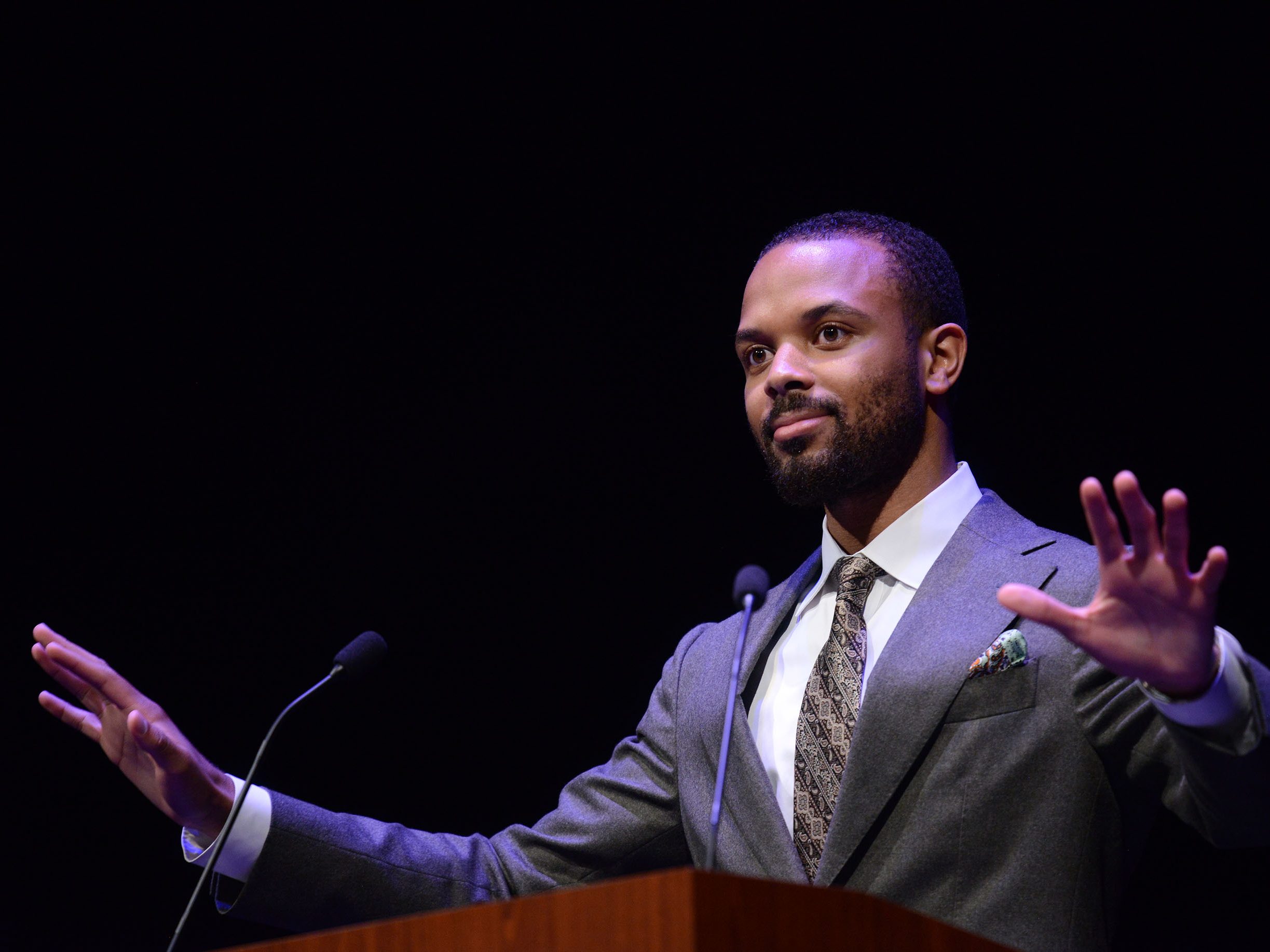Wood, the author of "Uncensored: My Life and Uncomfortable Conversations at the Intersection of Black and White America," delivered the 2019 Community Engagement Lecture on Tuesday, Oct. 1. The event was part of the Elon University 2019-20 Speaker Series.
Zachary Wood’s goal of promoting better understanding between groups of people with different political views recently got very personal.
As the free speech advocate explained Tuesday night to the crowd gathered in Elon’s McCrary Theatre, he was recently waiting to board a plane in New York when he glanced over and saw an older gentleman seated near him, looking at his phone that was adorned by a screensaver featuring President Donald Trump in a red “Make America Great Again” hat giving a thumbs up. Wood said from that single image, he quickly assumed what the man must believe about race, gender, class, the Black Lives Matter movement, the Me Too movement and other political and social issues.
“Then I had to stop and pause for a second, and say, ‘You know what? This is exaclty the kind of issue I have been talking about over the last five years,” Wood said during the university’s 2019 Community Engagement Lecture. “The tendency to make assumptions, to have preconceptions, presuppositions about people with whom we think we disagree when we haven’t had the opportunity to have an in-depth conversation.
“I thought to myself, ‘I better practice what I’ve been preaching,” Wood said.
What followed was a conversation of mutual respect with the man during which two people sought to better understand the basis of each other’s beliefs, where they diverged from each other, but also what values they found in common, Wood said. It’s an example of what can happen when two people take the time to listen to each other instead of concentrating on making sure their own views are hear, that they win the argument.
“There are fundamental things that drive us, that motivate us, that undergird the policies we advocate for, that inform our positions at the negotiating table, that really do connect across the differences we may have with respect to our backgrounds,” Wood said. “Having a conversation with someone with whom you disagree can be of great value. You can learn something not just about the person you are talking to, but you can learn something about humanity, and about yourself.”
I hope that we can remember that no one is right all of the time, that while conflict is inevitable, cooperation always works better, and that in the end, what we have in common is far more important than our differences
Wood’s visit to Elon is part of the 2019-20 season of the Elon University Speaker Series, which this year has the theme Quest for Truth. An activist for free speech and dissenting opinions, Wood rose to national prominence while still a student at Williams College, where he headed the group “Uncomfortable Learning.” Wood graduated from Williams in 2018, the same year he published “Uncensored: My Life and Uncomfortable Conversations at the Intersection of Black and White America.”
While leading Uncomfortable Learning, Wood invited speakers to campus who held controversial views, some of who were deeply conservative or libertarian and whose views ran contrary to many at Williams. “I anticipated some pushback,” Wood told the crowd. “I did not anticipate as much as I received, but I resolved to persist and continue to face in the face of the resistance I encountered.”

That pushback included a petition that would lead to one speaker to be disinvited from campus, and the administration stepping in to disinvited another controversial speaker. Wood said he was assailed on social media, where some even accused him of being a white supremacist.
“Obviously they had not met me,” said Wood, who is black.
During this time, Wood said he drew from his experiences as a child, when his mother struggled through mental illness that saw her furious over something one moment, and then ecstatic the next. “Having to navigate that terrain at home as a child cultivated in me a deeper sense of empathy,” he said. “It made me conscientious, it made me more careful, it made me more patient and it made me more alert. It made me study people because I had to study my mother.”
At Williams, Wood said he learned there were three things that were integral to building a connection with someone — find a way to validate the person you’re talking to, affirm some aspect of their identity that is of value to them, and find a way to express gratitude to a person for sharing their views.
“I hope that we can remember that no one is right all of the time, that while conflict is inevitable, cooperation always works better, and that in the end, what we have in common is far more important than our differences,” Wood said. “I believe if we can remember that, we can come together for mutual enlightenment.”
Wood was introduced Tuesday by Tamara Evans ’23, who emphasized in her remarks the importance of listening to those with different beliefs. “Even though you don’t agree with them, you still can gain an understanding of what they are trying to say,” Evans said.



